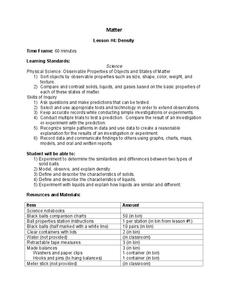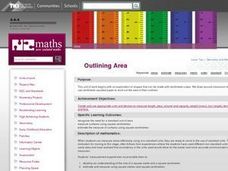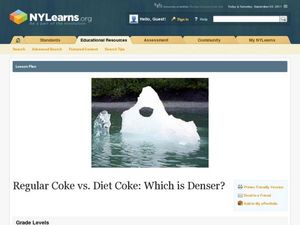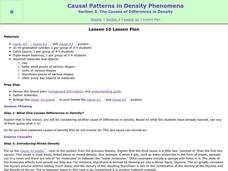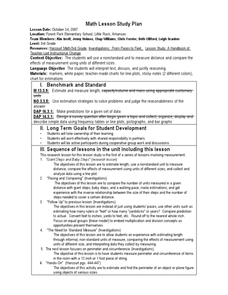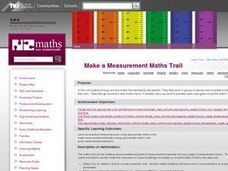Curated OER
Density
Learners predict when an object will float or sink based on comparison of density of the object to the density of the substance in which it is placed. The access a website and sketch the object in the first column of their table and then...
Curated OER
Oranges and Stopwatches
Students measure various attributes of an orange. They discuss the attributes of an orange that can be measured, develop a list of attributes and describe how they can measure it, and rotate through four stations measuring the volume,...
Curated OER
International System of Units: Metric System
Young scholars listen to lecture on metric system, make vocabulary book containing at least fifteen related terms, measure length, mass, and volume using appropriate metric units, and measure temperature using Celsius scale.
Curated OER
Outlining Area
Explore measuring various objects using square centimeters. Learners create various shapes using five centimeter cubes, calculate the area in square centimeters of different classroom objects, and discover who has the largest mouth,...
Curated OER
The Scientific Method
In this scientific method worksheet, students read over the basic steps of the scientific method and then apply those steps to a specific example. This worksheet has 8 short answer questions.
Curated OER
Tools of the Trade
Third graders explore and identify the tools that can be used to measure length, mass/weight, and volume. They discuss how things are measured using different units, and observe the difference between the English and the Metric systems....
Curated OER
Regular Coke versus Diet Coke, Which is Denser?
Young scholars investigate the density of liquids. For this geometry lesson, students calculate the volume and differentiate between volume, mass and density. They observe similarity and differences between coke and diet coke.
Curated OER
Density Destiny
Sixth graders measure and investigate the densities of several objects. They, in teams, determine the mass and volume of each of the 5 objects and record the measurements in the data table.
Curated OER
The Causes of Differences in Density
Students explore the causes of differences in density. Students choose objects, measure the mass and volume, and calculate the density of each. They perform additional density experiments to model atoms and their correspondence to...
Curated OER
DENSITIES OF REGULARLY SHAPED SOLIDS
Students calculate the volumes of regularly shaped objects from measurements of their dimensions. They use several formulas and measure different objects to calculate the density, volume, and mass of the objects selected or assigned.
Cornell University
Buoyancy
Swimmers know to float by turning their bodies horizontally rather than vertically, but why does that make a difference? In an interesting lesson, scholars explore buoyancy and the properties of air and water. They test cups to see which...
Curated OER
The Heat of Fusion of Ice
Students measure the heat of fusion of ice. In this heat of fusion lesson plan, students use a calorimeter or Styrofoam cup and thermometer to measure the change in temperature of the water in their calorimeter. This allows students to...
Curated OER
Discovering Density
If you have a set of six various metal rods, you can use this lab activity to challenge science students to calculate their densities. They will use a triple beam balance to measure the mass and the micrometer and ruler determine the...
Curated OER
Thirsty Rocks: Please "Porous" a Drink!
A simple activity goes a long way in demonstrating the property of porosity to your rock hounds. They will mass a specimen of dry sandstone and then soak it in a pre-measured amount of water. After seven minutes, they once again measure...
Cherry Creek Schools
Physical Science Final Exam Review Packet
If you need a way to assess the concepts in your physical science class, use an extended set of worksheets as a midterm or final exam. It includes questions about density, physical and chemical matter, speed and velocity, weight and...
Cornell University
Thin Films
Combine mathematics and science to calculate measurements of unmeasurable materials. Individuals use knowledge of density and volume to determine the thickness of the film used in production. They also apply stoichiometry to determine...
Laboratory for Atmospheric and Space Physics
Jupiter’s Relative Size
How do you properly illustrate the extreme size difference between two planets—Earth and Jupiter? With the help of jellybeans, of course! Create a scale model of Jupiter's mass compared to Earth using a fishbowl, 1,400 beans, and a dixie...
Curated OER
Classification of Matter
This is a great worksheet with an infographic to assist your students in categorizing matter into mixtures and non-mixtures. Information is given about the metric system of measurement. Your young students match 13 terms with their...
Curated OER
Activity #6 'Nothing' Matters: A Demonstration
Students observe the 'pouring' of a gas. They compare the masses (weights) and densities of two gases. Pupils define the following terms: matter, mass, and density. Students answer questions after watching the demonstration.
Curated OER
The Same but Different Part II
Third graders experiment with beakers of water and balloons to measure the volume of the gas in the balloon. They determine ways to change the volume of air in the balloon which changes its size but not its physical state. By heating the...
Curated OER
Mother May I?
Third graders measure distance using nonstandard units of measure. In this measurement lesson, 3rd graders measure a given distance through the use of the game "Mother May I?" Student gather and compare data on how many "giant steps" and...
Curated OER
Make a Measurement Maths Trail
Students follow a math trail that has been created by the teacher. They follow the trail and answer math questions at stations along the way. They work in small groups to devise a math trail of their own which they share with another class.
Curated OER
Weighing stations
Learners work at a variety of stations involving practical measuring tasks. Estimation skills and the ability to measure accurately using kilograms and grams are developed.
Curated OER
Convert This!
Students use conversion factors to solve problems. In this algebra lesson, students convert between Metric and English Units. They measure different objects and using both systems in their units.


